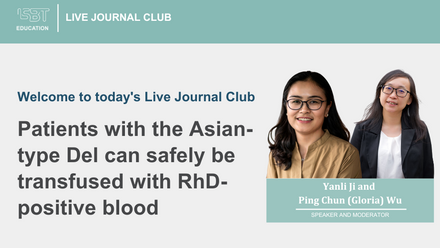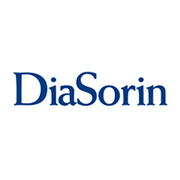The Fetal Maternal Immunology session included the following presentations:
1. Cecile Toly-Ndour: Rh disease prevention for women with partial D: is routine antenatal anti-D prophylaxis useful?
2. Mees Bruin: Natural course of pregnancies with alloantibodies against human platelet antigen HPA-1a
3. Renske van 't Oever: Natural course of hemolytic disease of the fetus and newborn after pregnancy with intrauterine transfusions
4. Jonas Lowack: HLA class I antigen knock out endothelial cells, a tool for the detection of endothelial-specific anti-HPA-1a alloantibodies
5. Xueyu Jiang: Pre-administration of baicalin inhibits red blood cell immunization in a mouse model of red blood cell transfusion
6. Ellen van der Schoot: Fetal RHD genotyping by droplet digital PCR for D variant mothers or children
MODERATORS: Agneta Wikman, Alan Lazarus
After the presentation, there was a questions and answers session, which is also included in the recording.
Abstract
Pre-administration of baicalin inhibits red blood cell immunization in a mouse model of red blood cell transfusion
X Jiang1, J Yang1, Y Yang1, J Sun1, L Gao1, R Xie1
1Shanghai Blood Center, Institute of Blood Transfusion, Shanghai, China
Background: Baicalins, a flavonoid compound originally isolated from the root of the Chinese herb Huangqin (Scutellaria baicalensis Georgi), is an anti-inflammatory agent and has a good safety record in the clinic. YIN-CHEN-TANG is widely used in preventing haemolytic disease of the newborn(HDN) caused by Rh and ABO maternal-foetal incompatibility since 1970s in China. Baicalin is a major component of YIN-CHEN-TANG. It could reduce the severity of experimental autoimmune encephalomyelitis (EAE), asthma, colitis, systemic lupus erythematosus (SLE) and other immune diseases. However, its potential in inducing transfusion tolerance remains to be explore.
Aims: The aims of our study are to evaluate if pre-administration of baicalin could inhibit red blood cell (RBC) immunization and to elucidate the underlying mechanism of baicalin as a major component of YIN-CHEN-TANG in preventing HDN.
Methods: We used human red blood cells with adjuvant Lipopolysaccharide (LPS) and transfused mice to induce antibodies, as an experimental system to study the effect of baicalin in inducing transfusion tolerance. Mice were divided into a human RBC transfused positive control group administered with human RBC and LPS intravenously three times every two days, a control group preadministered dexamethasone (DEX; 10 mg/kg/day) intraperitoneally daily for 1 weeks before human RBC transfused, a treatment group preadministered baicalin (250 mg/kg/day) intraperitoneally daily for 1 weeks, and a normal control group. Assessment of human RBC immunization was performed by measuring serum immunoglobulin G (IgG) and immunoglobulin M (IgM) against human RBC weekly. And the lymphocyte changes in spleen were also monitored by flow cytometry.
Results: We found that baicalin treatment decreased serum IgG but not IgM production significantly after human RBC being transfused, with a concomitant reduction in Th17 cells and increase in CD4 regulatory T cells in both spleen and mesenteric lymph nodes. And there were no significant differences in the percentage of Th1, Th2, Tfh and Tfr CD4 subpopulation among all groups.
Summary/Conclusions: Our results indicate that pre-administration of baicalin could inhibit RBC immunization especially IgG production. Considering its good safety records in clinic, it may be exploited for suppressing transfusion immunization events especially as preventive drugs in necessary. In addition, our results elucidate the inhibitory effect in antibody production of baicalin may be a possible mechanism for YIN-CHEN-TANG as a widely used Chinese herbal medicines in preventing HDN.


















